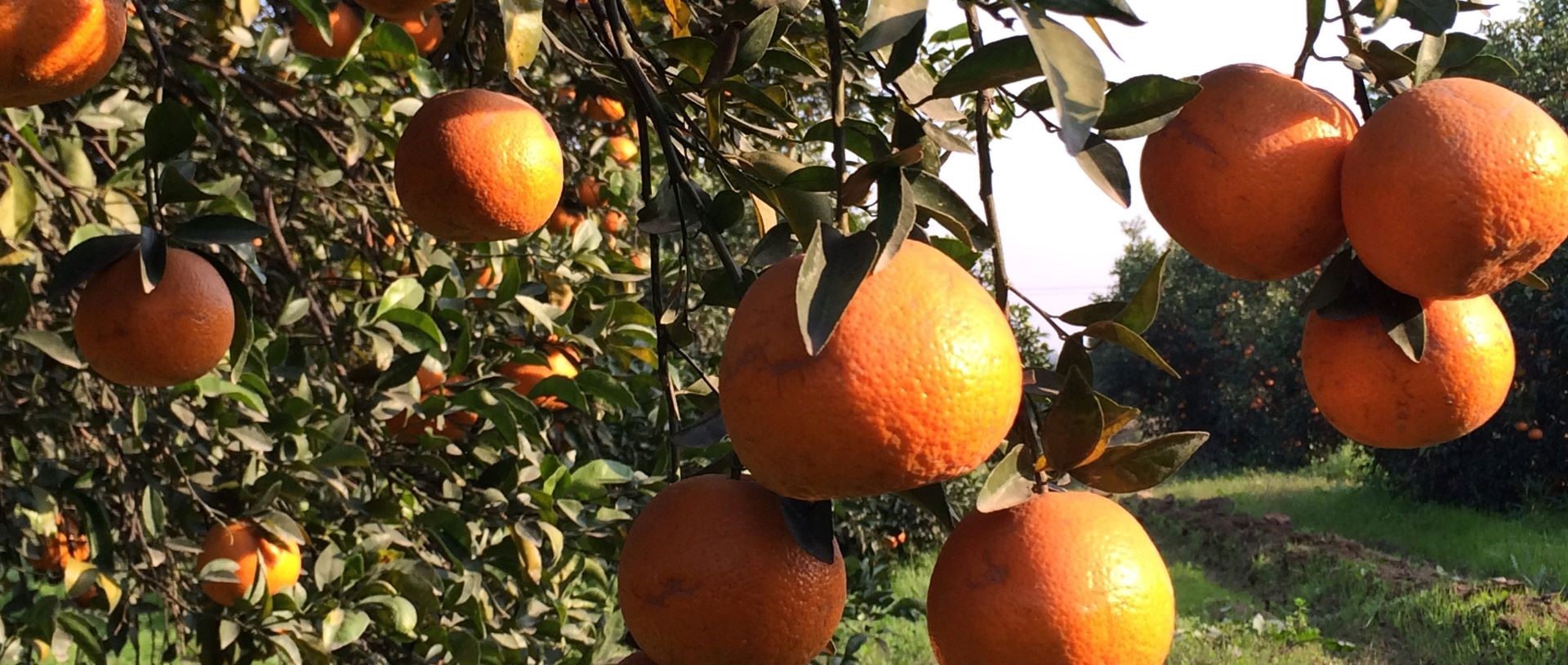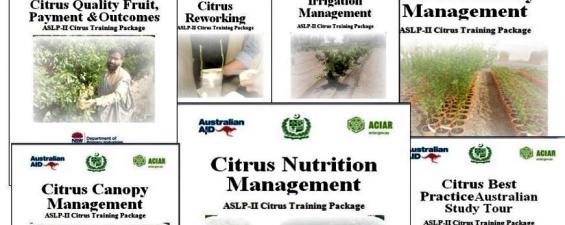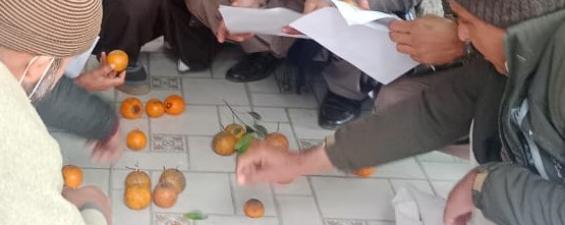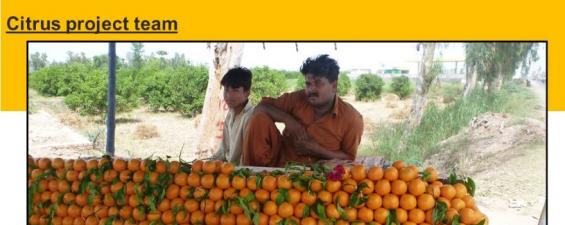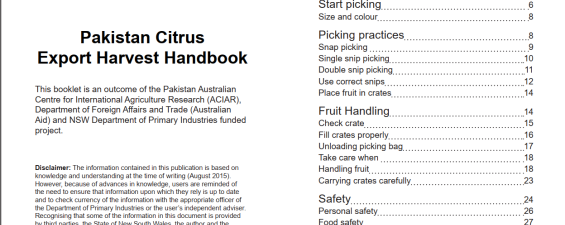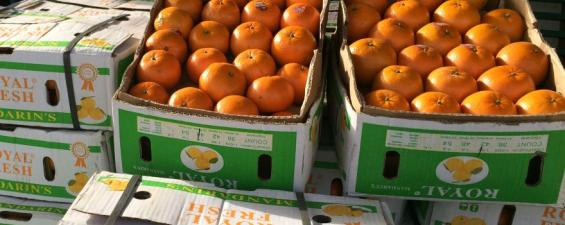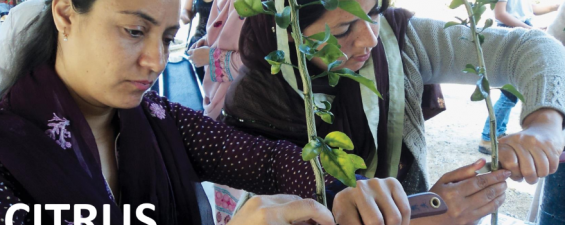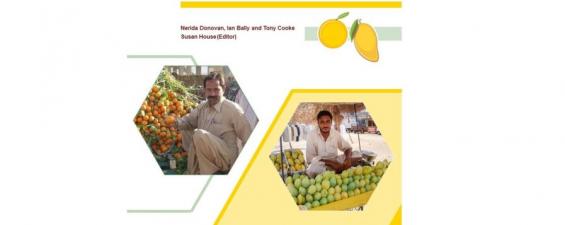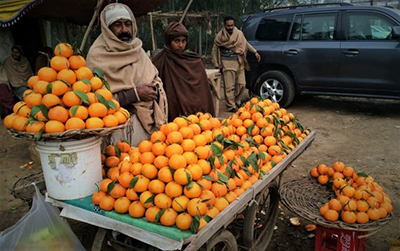
Citrus is one of Pakistan’s most significant horticultural crops, comprising about one-third of Pakistan’s fruit production. The flavourful, but seedy, mandarin variety “Kinnow” dominates production. Although popular in Pakistan and in some export markets, Kinnow is widely viewed as underperforming, due to many different factors. For this reason, a systems approach is underway to combine market perspectives, including postharvest quality monitoring tools, with smallholder perspectives. This will bridge the gap between consumers and smallholder families and build on the findings from previous citrus production research, as well as policy, irrigation and other ACIAR projects in Pakistan
Background
Pakistan is about the 13th-largest citrus producer globally with production steady over the past decade at 2 to 2.4 million tonnes annually from 200,000 hectares. Through ACIAR and other research, much is known about the citrus sector’s many production challenges, including pests, diseases, pruning, nutrition and irrigation. However, low profitability limits uptake of better practices.

Most citrus is grown in Punjab and half of this is grown in the Sargodha region, predominantly the mandarin variety “Kinnow”. This is well-suited to the local growing conditions and produces richly-flavoured fruit which is locally prized for fresh eating and juicing.
Exports account for about 10% of the crop but deficient value chains have limited export growth. In KPK, the main citrus type is Blood Orange which is in demand globally but is mainly consumed domestically. Alternative varieties have also been introduced for testing.
Improving Kinnow quality and value must be seen in the context of smallholders dominating production. About 60% of the industry’s growers have less than 2 hectares and 72% have less than 5 hectares. Almost 95% sell their crop in advance to preharvest contractors. This gives smallholders little to no agency to influence the price received and no access to knowledge about how their fruit is marketed. This is a disincentive to invest more into practices and technology that could increase production of fruit that consumers will buy.
Current research
An Australia-Pakistan-China partnership will compare consumer preferences with delivered quality through monitoring and modelling. Postharvest studies will complement existing production guidelines to optimise fruit quality. Market analysis will identify domestic and Chinese seasonal opportunities and competition, along with market access and GAP requirements.
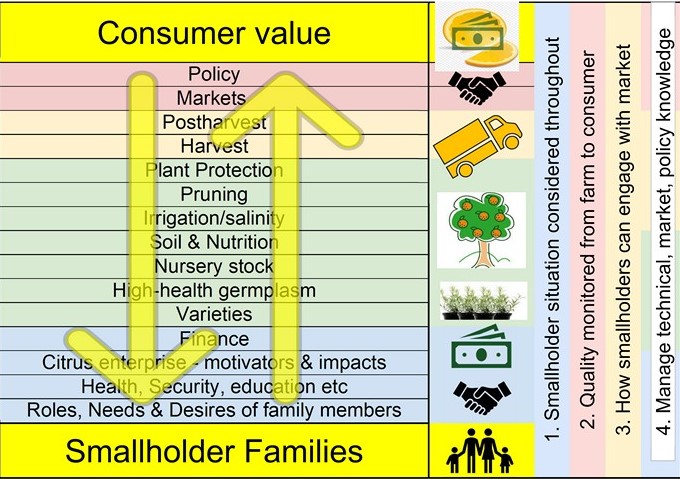
Options to address these technical/logistic/market factors in a coordinated way will be investigated, incorporating government and commercial stakeholders. However, smallholders’ perspectives will be paramount, given their potential to provide the fruit needed to fulfil the market opportunities. A key focus for coordination will be knowledge management. This is a major element of managing risks ranging from traders investing in the cool chain to farmers investing in new trees.
Smallholders are often the most disadvantaged in terms of access to information tailored to their context. Read more about the role of social science and gender inclusion here.
The project will engage closely to build a picture of the needs and aspirations of citrus-growing families, building on previous social research and rural transformation studies in Pakistan. It will ascertain the factors affecting engagement in the value chain, including access to knowledge, finance or markets. This will include assessing the effectiveness of partners in enabling (and rewarding) better practices by smallholders.
This project will be the first systems approach to combine market perspectives, including postharvest quality monitoring tools, with smallholder perspectives. It aims to facilitate a whole-of-value chain approach to Pakistan citrus sector development to test the proposition that the well-being of smallholder families will be improved if Citrus quality meets market needs and growers receive equitable share. Read more about the value chain approach here
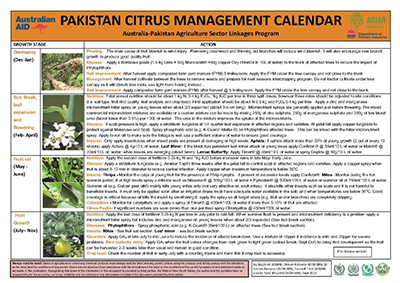
From 2006-2015, at the request of the Government of Pakistan, Australia’s Department of Foreign Affairs and Trade (DFAT) partnered with ACIAR to conduct citrus research within the Agriculture Sector Linkages Program (ASLP). This focused on Varieties and Nursery Practice; Production Best Practices; and Quality Payments trials.
Seeking alternatives to Kinnow, the project introduced, multiplied and tested fourteen alternative citrus varieties and ten rootstocks. This included establishing insect-proof screenhouses to maintain the disease-free status of the mother plants. Variety testing is a long-term process, so the project partners nurtured the local expertise necessary to maintain and evaluate these variety trials.
Healthy germplasm has been the foundation of the Australian citrus industry for many decades and this extends to the methods used by nurseries to grow the trees. A nursery manual and videos were produced to supplement the extensive training provided to nursery businesses and staff, including 22 women in KPK who run small “home nurseries”. Farmers were shown how to “rework” existing trees using budwood from the new varieties.
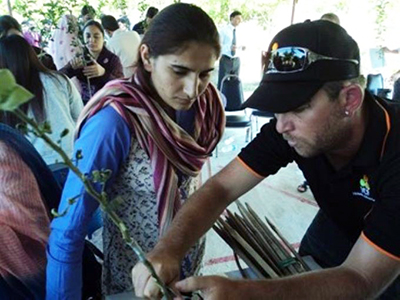
On-farm demonstration cluster sites exposed farmers to “best practice” production methods including pest and disease management, pruning, irrigation and fertiliser use, as well as harvesting practices. There was close liaison with government extension programs through staff training as well as hosting multiple large field days and Farmer Field Schools reached 4450 growers in Punjab and 1850 in KPK. This information remains relevant and valuable and is available through a series of training packages listed in the Resources section below.
While the primary focus was on improving productivity and quality, the project team also recognised the need for improved value chain efficiencies. This included a “Quality Payments” pilot, as an alternative to the standard practice of forward-selling the crop to contractors. In grower trials, “best practices” resulted in fruit of higher grade than the estimate at time of contract. This provided a win-win, meeting market preferences and delivering premiums to the growers. A Citrus Value Chain scoping study was also conducted to identify options for future focus on value chain improvement in the Pakistani citrus industry
Partners
The University of Queensland (UQ) leads the current citrus research in collaboration with researchers from Queensland Department of Agriculture and Fisheries (QDAF), in partnership with research partners in Pakistan and China.
In Pakistan, collaborators are the University of Agriculture Faisalabad (UAF),
University of Sargodha (UoS), and Punjab Department of Agriculture (DoA) including Citrus Research Institute (CRI) Sargodha and the “Establishment of Model Farms Project” (EMFP) of DOA.
The key China partnership is with the Chinese Academy of Sciences (CAS), building on ongoing research relationships involving DAF, UAF and CAS.
